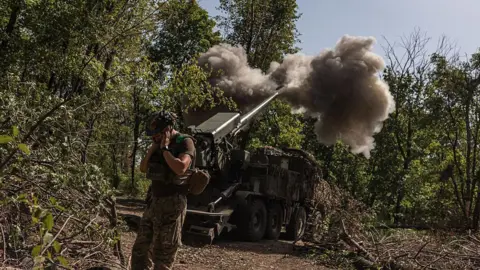Paul KirbyEurope digital editor
 Anadolu via Getty Images
Anadolu via Getty ImagesThe leaders of about 30 Western countries are taking part in a summit in Paris with Ukraine’s Volodymyr Zelensky, with the aim of giving Kyiv security assurances if a ceasefire is agreed, and persuading the US to provide support.
Hopes of a deal to end the fighting have receded since Russia’s Vladimir Putin met Donald Trump in Alaska, although the US president said on the eve of Thursday’s talks that “we’re going to get it done”.
Trump was due to talk to leaders of the “Coalition of the Willing” by phone after the Paris summit, and French officials said it was important for many European partners that any military guarantees for Kyiv involved an “American safety net”.
Last month he said the US was willing to help “probably” with air support, and Western allies are keen for Trump to confirm that.
The summit opened on Thursday, chaired by France’s Emmanuel Macron and UK Prime Minister Sir Keir Starmer, and many of the leaders took part remotely.
Nato chief Mark Rutte said the aim was to have “clarity” on what the coalition could deliver so they could discuss what the Americans could provide.
Air support could include help with air defence or intelligence, but details so far are vague.
A source at the Élysée Palace said there were three aims behind the security guarantees: to strengthen Ukraine’s armed forces; to support them by deploying a separate force to make it clear to Russia that Ukraine has Western backing; and to have a US safety net, which the Americans would obviously have to maintain.
Ukraine’s Volodymyr Zelensky said ahead of the talks that Kyiv had received “signals” from the Americans that they would provide a backstop.
US special envoy Steve Witkoff arrived in Paris ahead of the summit and reports said he was due to meet Zelensky.
More than 40 months after Russia’s full-scale invasion of Ukraine, Putin has said this week that there is “a certain light at the end of the tunnel” and that “there are options for ensuring Ukraine’s security in the event the conflict ends”.
However, Russia has made clear that no Western forces should be deployed to Ukraine and it has insisted that it should be one of the countries acting as “guarantors” – an idea rejected by Kyiv and its allies.
Putin has also raised the unrealistic prospect of Ukraine’s Volodymyr Zelensky coming to Moscow for talks.
Mark Rutte said on Thursday that Russia had no veto on Western troops being deployed to Ukraine: “Why are we interested in what Russia thinks about troops in Ukraine? It’s a sovereign country. It’s not for them to decide.”
President Trump told CBS News on Wednesday that he remained committed to reaching a deal to end the war and said he continued to have a good relationship with both Putin and Zelensky.
“I think we’re going to get it all straightened out,” he said.
UK Defence Secretary John Healey has praised Trump, who he says “brought Putin into talks” and “not closed off any options”.
Ukraine is looking to the Coalition of the Willing to come up with a reassurance force involving British, French and other European troops. Germany has said it is too soon to make that kind of commitment.
The Russian leader, who spent Wednesday with China’s Xi Jinping and North Korean leader Kim Jong Un, claims that his country’s military is pushing forward on all fronts in Ukraine.
He warned that without a deal Moscow was prepared to “resolve all our tasks militarily”.
While Ukraine and its allies say a ceasefire should be agreed initially, Russia has insisted its campaign will not end before a full peace deal.
The source at the Élysée Palace said it had already become clear that Russia had no intention of having a ceasefire as part of a peace deal.
The source pointed to the demarcation line between North and South Korea, where a ceasefire had lasted for years with a powerfully armed, allied American deployment serving as a signal to North Korea. That concept was extremely important for the Ukrainians, the source added.
